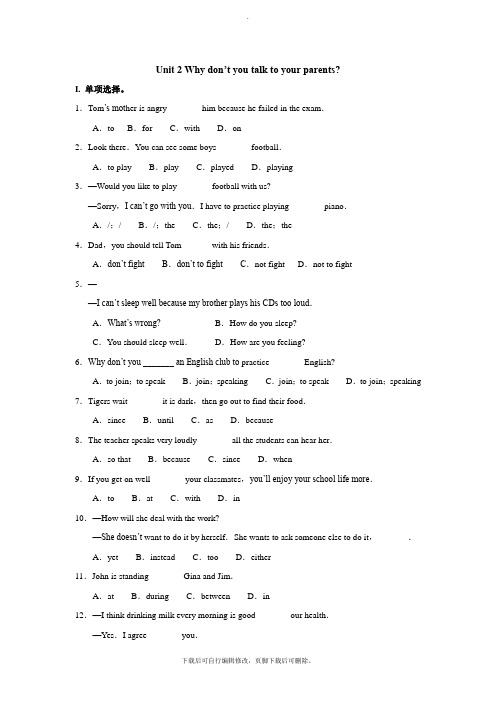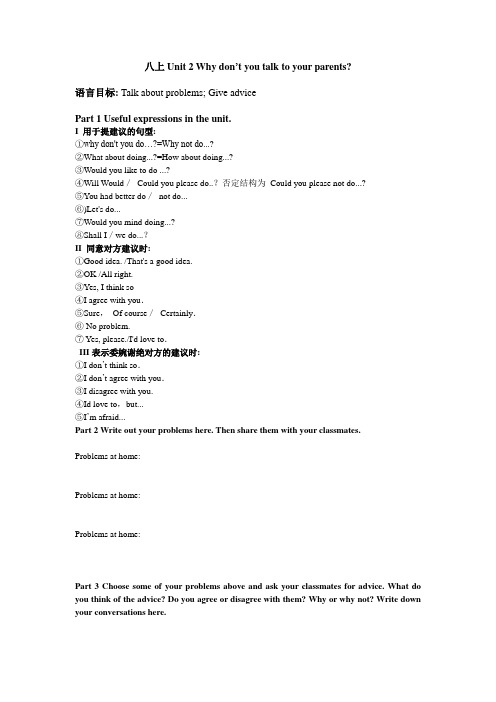鲁教版五四制英语八年级上册Unit 2 Why don’t you talk to your par
- 格式:doc
- 大小:104.50 KB
- 文档页数:5

Unit 2 Why don’t you talk to your parents?I. 单项选择。
1.Tom’s mot her is angry _______ him because he failed in the exam.A.to B.for C.with D.on2.Look there.You can see some boys _______ football.A.to play B.play C.played D.playing3.—Would you like to play _______ football with us?—Sorry,I can’t go with you.I have to practice playing _______ piano.A./;/ B./;the C.the;/ D.the;the4.Dad,you should tell Tom ______ with his friends.A.don’t fight B.don’t to fight C.not fight D.not to fight5.—_________—I can’t sleep well because my brother plays his CDs too loud.A.What’s wrong? B.How do you sleep?C.You should sleep well.D.How are you feeling?6.Why don’t you _______ an English club to practice _______ English?A.to join;to speak B.join;speaking C.join;to speak D.to join;speaking 7.Tigers wait _______ it is dark,then go out to find their food.A.since B.until C.as D.because8.The teacher speaks very loudly _______ all the students can hear her.A.so that B.because C.since D.when9.If you get on well _______ your classmates,you’ll enjoy your school life more.A.to B.at C.with D.in10.—How will she deal with the work?—She doesn’t want to do it by herself.She wants to ask someone else to do it,_______.A.yet B.instead C.too D.either11.John is standing _______ Gina and Jim.A.at B.during C.between D.in12.—I think drinking milk every morning is good _______ our health.—Yes.I agree _______ you.A.to;to B.with;to C.at;with D.for;with13.Sometimes walking is even _______ than driving during the busy traffic time.A.fast B.faster C.slow D.slower14.—Your father is sleeping now.Could you _______ the music a bit?—OK,mum.A.turn down B.turn on C.turn off D.turn up15._______ he exercises every day,_______ he is very healthy.A.Because;so B.Though;but C.Because;/ D.Though;/II. 完形填空。

八上Unit 2 Why don’t you talk to your parents?语言目标: Talk about problems; Give advicePart 1 Useful expressions in the unit.I 用于提建议的句型:①why don't you do…?=Why not do...?②What about doing...?=How about doing...?③Would you like to do ...?④Will Would/Could you please do..?否定结构为Could you please not do...?⑤You had better do/not do...⑥)Let's do...⑦Would you mind doing...?⑧Shall I/we do...?II 同意对方建议时:①Good idea. /That's a good idea.②OK /All right.③Yes, I think so④I agree with you.⑤Sure,Of course/Certainly.⑥ No problem.⑦ Yes, please./I'd love to.III表示委婉谢绝对方的建议时:①I don’t think so.②I don’t agree with you.③I disagree with you.④Id love to,but...⑤I’m afraid...Part 2Write out your problems here. Then share them with your classmates.Problems at home:Problems at home:Problems at home:Part 3 Choose some of your problems above and ask your classmates for advice. What do you think of the advice? Do you agree or disagree with them? Why or why not? Write down your conversations here.Part 4 Write a short passage about the conversation above in part 3.Part 5 Writing英语课堂上,老师要求学生就“与人相处”的话题展开小组讨论。

鲁教版英语八上Unit 2 Why don’t you talk to your parents Section A Grammar-4c 教学设计一. 教材分析鲁教版英语八上Unit 2 Why don’t you talk to your parents Section A Grammar-4c 主要讲解了一般现在时和一般过去时的用法。
本节课通过一个关于孩子们和父母交流的故事,引导学生理解并掌握一般现在时和一般过去时的区别和用法。
教材内容丰富,贴近学生生活,有利于激发学生的学习兴趣和积极性。
二. 学情分析学生在学习本节课之前,已经掌握了动词的一般现在时和一般过去时的基本用法,但可能在实际应用中还存在一定的困难。
因此,在教学过程中,需要结合学生的实际情况,设计合适的学习活动,帮助学生巩固和提高对一般现在时和一般过去时的理解和应用能力。
三. 教学目标1.知识目标:(1)能够理解并区分一般现在时和一般过去时的用法。
(2)能够运用一般现在时和一般过去时描述自己的日常生活。
2.能力目标:(1)能够听懂、说出一般现在时和一般过去时的句子。
(2)能够运用一般现在时和一般过去时进行简单的交流。
3.情感目标:(1)培养学生积极主动与父母交流的习惯。
(2)培养学生热爱生活,关注家庭情感的价值观。
四. 教学重难点(1)一般现在时和一般过去时的用法。
(2)运用一般现在时和一般过去时进行描述和交流。
(3)一般过去时态的构成和用法。
(4)运用一般过去时描述过去发生的事情。
五. 教学方法1.情境教学法:通过设置情境,让学生在实际语境中感受和理解一般现在时和一般过去时的用法。
2.交际教学法:通过小组讨论、角色扮演等活动,让学生在实际交流中运用一般现在时和一般过去时。
3.任务型教学法:设计具有实际意义的任务,让学生在完成任务的过程中,巩固和提高对一般现在时和一般过去时的理解和应用能力。
六. 教学准备1.教学材料:教材、多媒体课件、录音机、磁带。

鲁教版英语八上Unit 2 Why don’t you talk to your parents Grammar Focus-4c 说课稿一. 教材分析鲁教版英语八上Unit 2 Why don’t you talk to your parents Grammar Focus-4c,本节课主要讨论的是情态动词+动词原形结构的用法。
通过本节课的学习,学生能够掌握情态动词+动词原形的构成,了解其表示的可能性、建议、命令等意义,并能运用到实际情景中。
二. 学情分析八年级的学生已经掌握了部分情态动词的基本用法,如can, may, must等,但对情态动词+动词原形结构的理解和运用还不够熟练。
因此,在教学过程中,需要结合学生的实际情况,逐步引导学生掌握这一语法结构。
三. 说教学目标1.知识目标:学生能够掌握情态动词+动词原形的构成,理解其表示的可能性、建议、命令等意义。
2.能力目标:学生能够运用情态动词+动词原形结构进行口语交流,提高表达能力。
3.情感目标:通过本节课的学习,学生能够学会倾听他人意见,培养合作意识。
四. 说教学重难点1.教学重点:情态动词+动词原形的构成及用法。
2.教学难点:情态动词+动词原形在不同语境中的运用。
五. 说教学方法与手段1.教学方法:采用任务型教学法,情境教学法,分组合作学习法等。
2.教学手段:利用多媒体课件,图片,卡片等辅助教学。
六. 说教学过程1.导入:通过谈论日常生活中的建议和命令,引出本节课的主题,激发学生兴趣。
2.呈现:展示情态动词+动词原形的句子,让学生感知和理解这一语法结构。
3.操练:设计不同情境,让学生分组练习情态动词+动词原形的用法。
4.巩固:通过游戏、角色扮演等活动,让学生在实际语境中运用情态动词+动词原形。
5.拓展:引导学生运用情态动词+动词原形结构进行创新性写作。
6.总结:对本节课的内容进行归纳总结,强化学生对情态动词+动词原形的认识。
七. 说板书设计1.板书情态动词+动词原形的结构。

鲁教版英语八上Unit 2 Why don’t you talk to your parents Section B 1a-2e 说课稿一. 教材分析鲁教版英语八上Unit 2 Why don’t you talk to your parents Section B 1a-2e,本节课主要围绕着如何向父母提出建议和如何倾听父母的意见展开。
通过本节课的学习,学生能够掌握如何使用情态动词和疑问词来提出建议,并学会在交流中倾听父母的意见,提高学生的英语口语表达能力。
二. 学情分析根据对学生的了解,他们已经掌握了情态动词和疑问词的基本用法,具备一定的英语口语表达能力。
但在实际运用中,学生往往因为缺乏真实的语境和与父母交流的经验,而导致表达不自然。
因此,在教学过程中,需要创设真实的情景,引导学生主动参与,提高他们的口语表达能力。
三. 说教学目标1.知识目标:学生能够掌握情态动词和疑问词的用法,能够用英语提出建议,并能够倾听父母的意见。
2.能力目标:学生能够在真实情景中运用所学知识,提高英语口语表达能力。
3.情感目标:学生能够学会尊重父母,理解父母的意见,培养良好的家庭沟通氛围。
四. 说教学重难点1.教学重点:学生能够熟练运用情态动词和疑问词提出建议,并能够倾听父母的意见。
2.教学难点:如何在实际交流中自然地运用所学知识,提高口语表达能力。
五. 说教学方法与手段1.情境教学法:通过创设真实的情景,让学生在实际语境中运用所学知识,提高口语表达能力。
2.交际法:引导学生积极参与课堂交际活动,培养学生运用英语进行实际交流的能力。
3.任务型教学法:通过完成具体任务,让学生在实践中学会如何向父母提出建议和倾听意见。
六. 说教学过程1.导入:以一个日常生活中的情景为例,引导学生思考如何向父母提出建议。
2.展示:通过展示一个关于如何向父母提出建议的对话,让学生了解和学习情态动词和疑问词的用法。
3.实践:学生分角色进行对话练习,模仿展示中的情景,提高口语表达能力。

鲁教版(五四制)英语八年级上册单元知识点Unit2Why don’t you talk to your parents?Section A重点单词及短语1.allow允许;准许v.常用搭配:allow sb.to do sth.允许某人做某事例:The doctor allowed him to take a short talk every day.医生允许他每天进行短距离的散步。
【拓展】allow的常见用法:①allow sth.允许某事例:I don’t think she will allow it.我想她不会允许这件事的。
②allow doing sth.允许做某事例:We don’t allow smoking in our house.我们家里不允许吸烟。
③be allowed to do sth.被允许做某事例:Passengers are not allowed to smoke on the bus.公交车上不允许乘客吸烟。
2.look through快速查看;浏览look through为动词+介词型短语,后面接物。
例:Look through the passage quickly and answer the questions.快速浏览短文并回答问题。
【拓展】动词look的相关短语:look at看look for寻找look after照顾look around环视look forward to盼望look up向上看;查找查阅3.big deal重要的事big deal为习语。
例:If I don’t win,it’s not a big deal.如果我输了,那也不是什么大不了的事。
【拓展】deal的常见用法:①deal名词,意为“协议;交易”例:We did a deal with them last week.上周我们与他们达成了一项协议。
②deal作不及物动词,意为“处理”deal with sth.处理某事例:How did you deal with the bike?你怎么处理那辆自行车了?4.get on with和睦相处;关系良好get on with sb.意为“和某人和睦相处;和某人关系很好”,同义短语为get along(well) with sb.。
Unit2 SectionA 1a-2d 精品教案一、教学目标:1. 语言知识目标:1) 能掌握以下单词:a llow, wrong, guess, deal, work out能掌握以下句型:①—What’s wrong?—I’m reall y tried because I studied until midnight last night.② You could give him a ticket to a ball game.③ I think you should ask your parents for some money.④Why don’t you talk to him about it?2) 能了解以下语法:(1)能够运用所学知识谈论问题和困难、提出建议并做出选择;(2)能根据对方所提出的问题,给出一些合理的建议。
2. 情感态度价值观目标:培养学生良好的合作意识,鼓励学生大胆表达自己的想法和意愿。
正确认识生活中的一些困难,能采用正确的方式解决生活中的问题。
二、教学重难点1. 教学重点:1) Talk about the problems.2) Learn the new language points.2. 教学难点:能根据对方所提出的问题,给出一些合理的建议。
学会表达建议的一些方式。
三、教学过程Step 1 Warming up1. 导入学生们平时在学校和生活中存在的问题。
T: What’s the matter/ What’s wrong?S: He has too much homework to do.T: Do he like to do it?S1:No, he doesn’t. Because he doesn’t have any free time to do things he likes.…Step 2 Talking1. Look at these problems. Do you think they are serious or not? Ss discuss with their partners and give some advice.① I have to study too much so I do n’t get enough sleep.② I have too much homework so I d on’t have any free time to do things I like.③My parents don’t allow me to hang out with my friends.④ I have too many after-school classes.⑤ I got into a fight with my best friend.Step 3 Listening1. T: Tell Ss to read the sentences in 1a again. Make sure they know the meaning of thesentences.2. Play the recordin g for the Ss to listen and circle the problems you hear in 1a.3. Play the recording again. Check the answers with the Ss.Step 4 Pair work1. Let Ss read the conversation in the box.2. Use the information in 1a to make other conversations.3. L et some pairs act out their conversations.e.g. A: What’s wrong?B: I’m really tied because I studied until m idnight last night.A: W hy don’t you go to sleep earlier this evening?4. Language points1) allow v. 允许;准许allow sb. (not)to do sth. (不)允许某人做某事e.g. My parents don’t allow me to stay up late. 我父母不允许我熬夜。
Unit 2 Why don't you talk to your parents?【学习内容】Section A(1a-2d)【学习目标】1.掌握并灵活运用本课的重点词汇allow, wrong, guess, although, until, deal.2.重点短语too much, too many, look through, give back, so that.3.能听懂谈论问题和给出建议的话题。
4.情感态度目标:遇到问题要主动地去和家人、朋友或亲近的人交流;如果遇到身边的人遇到问题,能主动提供帮助。
【学习重难点】1.熟记本节课词汇和句型,并能灵活运用。
2.能将本节课话题用于实际交流中。
【学习过程】一、自主学习,英汉短语互译1._____________与某人交谈;2.___________________太多;3._____________有空闲时间;4.allow sb. to do sth.__________;5._____________与某人闲逛;6._____________课外辅导班;7._____________与某人吵架/打架;8._____________直到半夜;9._____________有足够的睡眠;10.write sb. a letter_____________;11._____________打电话给某人;12._____________令某人惊讶;13._____________擅长写信;14._____________快速查看;浏览;15.be angry with sb.__________;16.a big deal_____________;17.____________成功地发展;解决。
二、合作探究1.My parents don’t allow me to hang out with my friends.我父母不允许我跟我的朋友们一起闲逛。
Unit 2 Why don't you talk to your parents?Period 5【教学目标】1.语言知识目标:(1)复习though, as soon as, so… that等词的用法,掌握生词perhaps。
(2)能够用英语表达自己的建议,并就自己所熟知的问题发表看法。
(3)能用本单元所学的语言简单表达对困难的一些建议。
2.情感态度价值观目标:人的一生并不都是一帆风顺的,难免有一些挫折或困难,如果生活中发生了一些不尽如人意的问题,我们要学会冷静对待,学会合理的办法理性地解决。
【教学重点】1.能运用所学的语言知识来简单地表达自己对某一困难问题的看法和建议。
2.总结本单元所学到的重点词组及句型。
3.复习总结unless, as soon as, so that等词的用法,并能完成相关练习题。
【教学难点】运用所学的语言知识来写一封简短的信,表达自己对学生上课外辅导班这一社会现象的看法。
【教学过程】Step 1 Revision.Review the expressions and sentences.1.一个典型的美国家庭a typical American family.2.足球训练football training.3.删除cut out4.比较;对比compare…with5.逼得太紧push…so hard6.一个儿童的成长a kid's development7.疲惫的孩子们直到晚上七点钟后才到家。
The tired children don't get home until after 7:00 p.m.8.他们总是将自己的孩子与其他的孩子相比较。
They always compare their children with other children.9.他们为什么不让孩子们顺其自然呢?Why don't they let their kids be kids?10.所有这些活动会给孩子们导致很大的压力。
Unit 2 Why don’t you talk to your parents 【短语】1.have to do sth不得不做某事2.get enough sleep得到足够睡眠3. too much homework太多的家庭作业4. have time to do sth有时间做某事5. allow me to hang out with my friends允许我和我的朋友闲逛6.too many after-school classes太多的课外辅导课7. get into a fight with sb与某人打架8. what’s wrong怎么了9. study until midnight学习直到午夜10. go to sleep earlier更早睡觉11.write sb a letter给某人写信12. call sb up / call sb给某人打电话13. talk to sb跟某人谈话14. so…that以便15. go to his house去他的家16. take sb. to带某人去参加球赛17. be good at擅长18. write letters写信19. talk about sth on the phone在电话中谈论某事20. have a fight with sb跟某人吵架21.look through浏览22.take some of my new magazines and CDs 拿走我的一些新杂志和CDs23.give sth back to sb把某物归还给某人24.be angry with sb生某人的气25.tell sb to do sth告诉某人做某事26.thanks for your advice谢谢你的建议27.no problem没事28.work out解决29.get on/along well with和睦相处30.between···and···与···之间31.fight a lot经常吵架32.hang over笼罩33.my elder brother我的哥哥34.refuse to do sth拒绝做某事35.be fair公平的36.feel lonely and nervous感觉孤独和焦虑37.be normal正常的,平常的38.talk about sth with sb. 与某人谈论某事39.offer to do sth主动提出做某事40.around the house在家里41.so ··· that···如此...以至于...42.proper communication正确的交流municate with···和...交流沟通44.all the time一直,总是45.favorite show喜欢的节目46.feel better感觉更好47.in future不久,之后48.think for oneself独立思考49.keep on doing 持续做某事50.cause a lot of stress引起许多压力51.play/do sports做运动52.hang out with friends和朋友一起闲逛53.talk to parents or other family members 和父母或者其他家庭成员谈话54.spend time alone独处55.play computer games玩电脑游戏56.give sb a lot of pressure给某人许多压力57.get enough sleep得到充足的睡眠58.have enough free time有足够的空闲时间pete with sb和某人竞争60.take/have so many after-school classes上如此多的课后辅导班61.learn exam skills学习考试技巧62.get into a good high school进入一个好的高中63.a typical American family 一个典型的美国家庭64.football training足球训练65.cut out削减66.be successful成功67.not…until直到..才68.have a quick dinner快速吃晚饭69. it’s time for sth到了该干…的时候了70.know about了解71.send…to…把..送到72.all kinds of各种各样的pare ..with和..相比较74.push…so hard把…逼得太紧75.too much pressure太多压力76.a child’s development一个孩子的成长【重点句子】1.我的父母不允许我和我的朋友闲逛。
Unit2 SectionA 3a-3c 精品学案
【知识技能目标】
✧掌握并灵活运用本课的重点词汇relation communication argue cloud elder instead
whatever nervous offer proper secondly communicate explain clear
✧重点短语too much, too many, look through, give back, so that,
✧能听懂谈论问题和给出建议的话题。
【情感态度目标】
✧遇到问题要主动地去和家人、朋友或亲近的人交流;如果遇到身边的人遇到问
题,能主动提供帮助。
【自主学习】
1._____________和睦相处;关系良好:
2._____________经常吵架/打架
3._____________ 一大片乌云
4._____________笼罩
5._____________ 拒绝做某事
6.feel lonely and_______ 感到孤独、焦虑
7._____________主动提出做某事
8._____________以便
9._____________ 介意某人做某事
10._____________一直
11._____________ 使某事清楚易懂
【合作探究】
1.argue verb~ (with sb) (about/over sth)争论;争吵;争辩
∙My brothers are always arguing.
我的兄弟们总是争论不休。
∙I don't want to argue with you—just
do it! 我不想和你争辩——请干吧!
别和我争辩。
Don't ______ _____ me.
我们总是为钱吵嘴。
We're always ______ _____ each other _____money.
2.explain verb说明,解释~ sth (to sb)
∙It was difficult to explain the problem
to beginners. 对初学者解释这个问题很难。
∙First, I'll explain the rules of the
game. 首先我要说明一下游戏规则。
∙Before she ran away, she left a note explaining her actions.
逃跑前,她留下一张便条解释原委。
∙—'Let me explain, sir.' — 'Don't tell me about it. I don't want to know.'
“您听我解释,先生。
”——“别跟我说,我不想知道。
”
你能说明一下电子邮件系统的工作原理吗?
______ _____ ________how the email system works?
‘It works like this,’ she _______.
“它是这样工作的。
”她解释道。
3.elder adj. [only before noun]指人,尤指同一家庭里两个成员年纪较长的
∙my elder brother我的哥哥
∙his elder sister他的姐姐
∙the e lder of her two daughters.
她两个女儿中年长的那个
✧辨析older ♦ elder
old 的比较级通常为older。
英国英语中形容词elder 通常只用来指哥哥、姐姐。
older用于指年龄。
elder 后不能接than,而older 则可以。
我有个姐姐。
I've got a sister who i s ____than me .
municate verb~ (with sb)(与某人)交流(信息或消息、意见等);沟通
∙We only communicate by email.
我们只是互通电邮。
∙to communicate a message to sb。